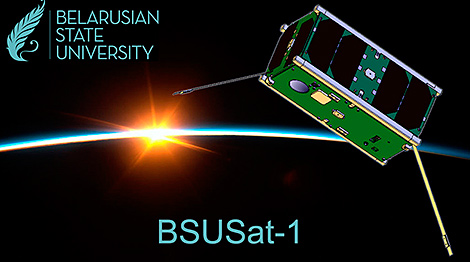Business news
Belarusian State University to launch second nanosatellite in 2021

Image courtesy of the Belarusian State University
MINSK, 26 January (BelTA) – The Belarusian State University (BSU) intends to launch its second nanosatellite in 2021, BelTA learned from Piotr Pekutko, Deputy Head of the Science and Innovations Office of the Belarusian Education Ministry, at a press conference on 26 January.
The official said: “This year we are going to launch the second nanosatellite of the Belarusian State University for scientific and educational purposes. Its functionality is designed to take care of educational tasks. It is kind of a lab meant to advance new directions in education. Students are involved in the development of the satellite and the analysis of incoming data. The launch of the nanosatellite and its purposeful operation will end the complex of measures to create the physical infrastructure and the research and methodology basis of the system for training personnel in the area of development and operation of small spacecraft.”
Despite its small size the new nanosatellite will contain all the necessary instruments. In particular, it will be fitted with systems that can take radio occultation measurements of the atmosphere and can study magnetic anomalies. “We will continue developing technologies for using remote Earth sensing data, including for monitoring bodies of water, forests, and terrains,” the official added.
In turn, the National Academy of Sciences of Belarus is working on a new large satellite for the remote sensing of Earth with the spatial resolution of 0.35 meters (the existing Belarusian satellite BKA has a spatial resolution of 2 meters). “We need it because we need more detailed information for precision farming and unmanned transport. We are looking for investors and money. It is a costly task,” First Deputy Chairman of the Presidium of the National Academy of Sciences of Belarus Sergei Chizhik noted. The scientists intend to launch the new satellite in the current five-year term.
In 2003 the head of state authorized the creation of a space satellite and the Belarusian system for the remote sensing of Earth powered by the satellite. BKA was launched from the Baikonur cosmodrome, Kazakhstan on 12 July 2012. It became part of a constellation of satellites together with the Russian satellite Canopus-V No.1. In January 2020 the National Academy of Sciences of Belarus and the Russian state corporation Roscosmos signed an agreement on expanding capabilities of this satellite constellation by leveraging resources of the Russian satellites Canopus-V No.3, 4, 5, and 6 and the satellite Canopus-V-IK.
The Belarusian State University’s nanosatellite BSU Sat-1 was put in orbit from the Jiuquan Satellite Launch Center, China on 29 October 2018. It became the first university satellite in the Belarusian education system and the third object of Belarusian origin in the Earth orbit (in addition to the BKA satellite and the communications satellite Belintersat-1). With its relatively small weight (about 1.6kg) it has all the characteristics of large universal satellites. It is fitted with power supply, control, orientation and stabilization systems, telemetry, a complex of technological and scientific payloads. It also has a digital camera, a radiation spectrometer, an infrared detector, and other special tools. The software for the satellite has been developed by BSU scientists. The flight program was custom-made to match the technical characteristics of the booster rocket, the satellite service platform, and tasks of the satellite’s core equipment.







 print version
print version make home page
make home page add to bookmarks
add to bookmarks

